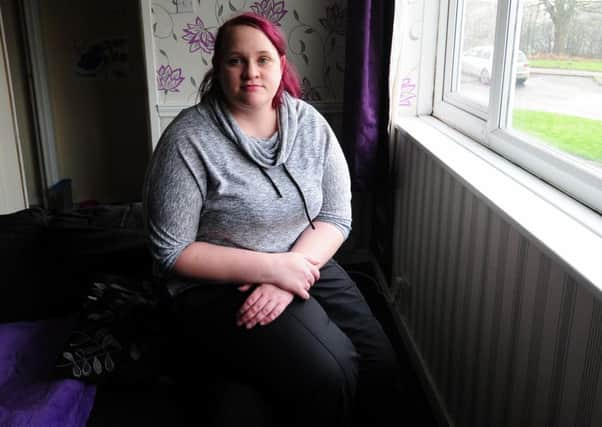The faces of poverty in modern Britain


Claire Hughes left school at 16 with 10 GCSEs to her name but didn’t want to do A-levels or go on to university because she didn’t want the debt it would inevitably bring.
Instead, she spent a couple of years doing low paid jobs in cafes and restaurants, before taking on a business administration apprenticeship to gain the skills and experience she needed to get a foot on the career ladder. “I wanted to do something with better career prospects,” she says.
Advertisement
Hide AdAdvertisement
Hide AdThis was in 2014 and she was getting paid £3 an hour which, at the time, was above the minimum wage for apprenticeships. But with no access to any benefits and with rent and bills to pay she struggled to get by, and with more money going out than coming in she ended up with spiralling debts.


“I got a weekend job working in a cafe so I ended up doing 60 or 70 hours a week,” says Claire, who shared a rented flat with a friend who was in a similar financial predicament.
“Each month I kept going deeper into my overdraft. I just tried to scrape by – I didn’t buy any shoes or clothes for a year because I couldn’t afford it.
“I never went to a foodbank but there were times when I came close to going. At one point I didn’t have a shower for a week because I didn’t want to use the water.”
Advertisement
Hide AdAdvertisement
Hide AdBut trying to keep her head above water eventually took its toll. “It reached the point where I couldn’t afford to pay my rent.”


Claire was forced to turn to her parents for financial help and says that battling with debt had another, more worrying, impact.
“I became stressed and it affected my mental health,” she says. “I felt like I was being punished for trying to better myself.”
She believes the Government should do more. “I don’t think it’s the employer’s fault. I worked for a small business that couldn’t afford to pay me any more but I think the Government could top up wages, or you should at least be entitled to some kind of benefits like a student loan.”
Advertisement
Hide AdAdvertisement
Hide AdThankfully her situation has improved. In 2015 she joined a higher level apprenticeship scheme with the Civil Service, earning £24,000 and where she’s guaranteed a job at the end of it, and she now lives with her partner in Doncaster.
But Claire, who is also an adviser to the Young Women’s Trust Apprenticeship Working Group, says there are too many working people who feel trapped by their situation.
According to the Joseph Rowntree Foundation’s annual state of the nation report, published last year, more than a million people in Yorkshire are living in poverty.
It’s a huge number, though the Government says it is tackling the issue, pointing to the National Living Wage which was introduced last year to great fanfare for all working people aged 25 and over.
Advertisement
Hide AdAdvertisement
Hide AdThis will rise from £7.20 an hour to £7.50 in April this year, but is it really a ‘living’ wage?
Claire Robinson doesn’t think so. She’s a hospital domestic (cleaner) in Leeds where she has worked for the past five years. Claire, who is also a volunteer communications officer for Unison, gets paid £7.80 an hour.
She lives in a council flat and says she has £100 a month to live off once all her bills, which include council tax, TV licence, bus pass and utilities are paid.
It’s a paltry sum but the truth is there will be many working people all over the country in a similar predicament.
Advertisement
Hide AdAdvertisement
Hide Ad“If I didn’t have a credit card I wouldn’t have food and if I didn’t have my mum I wouldn’t have food,” she says.
“I’ve got two storage heaters in the living room and I’ve only just put the second one on. But to put the second one on I’ve had to turn the heating off in my bedroom because I can’t afford it. But equally, I can’t afford to sit in my living room when it’s colder in my flat than outside.”
Claire’s job is classed as part-time, she works 30 hours a week, and her monthly wage is around £800 if she doesn’t do any overtime. “I love working for the NHS, I really do, and they do look after you. I just wish there were more hours, or less hours so I could get another job.
“Even though I only do six hours a day because it finishes at half one, most places want you to start at 12 o’clock for an afternoon shift. I’ve considered getting a second job but then I’d never be at home.”
Advertisement
Hide AdAdvertisement
Hide AdShe’s tried getting housing benefits but says she’s only eligible to claim £1 a month. “Even though it’s only £1 I’ve applied for it and I’m just waiting to hear back. I know it sounds petty but a pound is a loaf of bread... and where I shop it’s two loaves of bread.”
Other than that she says she doesn’t have access to any other regular benefits. She has a credit card but says she only got one out of desperation.
“I’d purposely gone years without a credit card because I knew I’d spend on it. But it just got to the point where I was sick of struggling so I got one for food shopping and Christmas presents.”
The card has a £2,500 and she makes sure it stays below £2,000, paying off the minimum amount each month. “Granted, that probably works out worse in the long run but at least I’ve got food to put on my table.”
Advertisement
Hide AdAdvertisement
Hide AdLow wages and credit card debts might be manageable if you’re in a job where you know you’re going to climb the ladder and earn more money in the future.
But for others whose wages aren’t going to rise a great deal it can be a harsh reality. “It’s not a living wage because I’m not living.
“I’ve got no social life. I go to work, come home, put something together to eat and the next day go back to work. I even started going to bed earlier just so I didn’t have to eat,” she says.
“Basically everything seems to be going up in price and my wage isn’t. It’s got to the point where I’ve been round my flat looking at stuff that I don’t use that I can sell.”
Advertisement
Hide AdAdvertisement
Hide AdClaire’s story is not an isolated case but one that is repeated in towns and cities all over the country. She, too, would like to see more support for low-paid workers.
“Why can’t some of the benefits go to the people who are actually working? If I could get working credits, even £20 a month, and I’d be happy with that. But it’s not going to happen.
“I just have to keep on struggling and see what else I can cut down on and hope for the best.”
She toyed with the idea of moving back in with her mum, but doesn’t think this is fair on either of them. “I was better off on benefits but I didn’t like going to the job centre.
Advertisement
Hide AdAdvertisement
Hide Ad“My mum will help me out but I don’t like asking her. I’m 28, I should be able to stand on my own two feet. She’s my mum not my cashpoint.
“I’ve got my own wage coming in but I’m struggling to survive on it. It’s really hard making the ends meet and sometimes they don’t.”
Government says it is helping workers trapped by low pay
The Department for Work and Pensions (DWP) says it is tackling in-work poverty.
A spokesman told The Yorkshire Post: “Work is the best route out of poverty so it’s welcome that we have record numbers of people in jobs in Yorkshire and the Humber, while across the country the unemployment rate is at an 11-year low and wages are rising.
Advertisement
Hide AdAdvertisement
Hide Ad“We are increasing the National Living Wage, have frozen fuel duty for seven years running and our increases to the personal allowance have reduced tax bills for some of the lowest earners by £1,000 a year.
He added: “Through Universal Credit we are for the first time supporting claimants who are in low-paid work to increase their earnings and progress in their careers.”